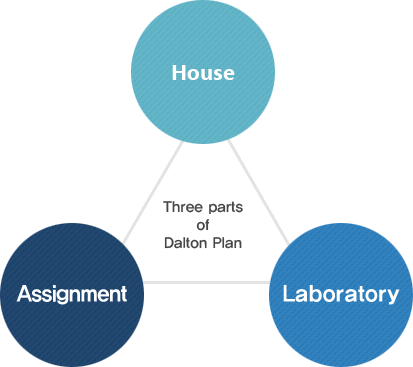- The educational method that was proposed by Helen Parkhurst in 1908 in the United States. In an attempt to rectify the ills of the school system of the time, Parkhurst advocated the Dalton Laboratory Plan, which customizes subjects and study locations to match the student’s ability and needs so that each individual can work to self-driven study plans.
- Based upon this plan, Parkhurst founded a small school in the town of Dalton in the State of Massachusetts in 1919.
- The original name of the Dalton School the Children’s University School because of its goal of developing intellectual interest and a keen, inquiring mind in every child. Since relocating to a residential area near Central Park in New York in 1922, the Dalton School has sent many students out into the world after they completed its integrated educational program, which covers from infancy to senior high school.
Different students all have different ways of thinking and doing tasks. Providing sufficient time for learning and keeping to the pace of how the individual student proceeds nurtures students’ motivation and approach to learning, as well as their ability to persevere.
Two Principles of the Dalton Plan:
- The principle of freedom fosters independence and creativity, beginning with the individual’s interests.
- This fosters the ability to think and act by oneself
- Heightens interest and concern, cultivating inquisitiveness
- Enhances the abilities to concentrate and persevere when undertaking tasks
- The principle of cooperation enables children to master social skills and collaboration through exchanges with a variety of people.
- Instills optimal attitudes from a social standpoint
- Nourishes the quality of consideration
- Fosters collectivity and cooperativeness
Three-Part Structural Foundation of the Dalton Plan’s
- HOUSE
The House is a home-like classroom, the same as a general homeroom in Japan. The teacher in charge of a House is known as the House Advisor. A House is a center for the numerous activities that go on in the school, and House advisors are not just in charge of the Houses but serve as planners who facilitate smooth relating among students, parents, specialty teachers and others.
- ASSIGNMENT
The Assignment is a contract (commitment) between a student and teacher that both produces the student’s desire to learn and fosters independence and planning ability. Age-appropriate topics are assigned, and children bear the obligation for honoring their commitments by the appointed times. They simultaneously learn how to efficiently use their time and how to plan what to do when, and how much to proceed.
- LABORATORY
The Lab (“laboratory”) provides students with vital chances to study specialty subjects more deeply. In the lower grades, teaching is centered on the House advisors, but as children proceed to the higher grades, their involvement with teachers who specialize in certain subjects increases. Ultimately, children conduct specialized research on themes that match their individual interests for learning experiences that are genuinely “lab-worthy.”
